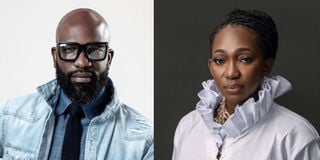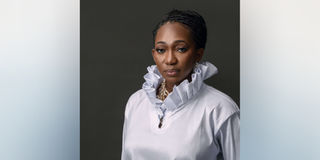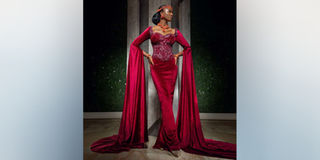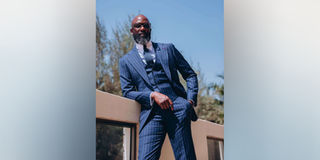Premium
A chat with some of Nigeria’s leading fashion designers

Nigerian fashion designers Mai Atafo (left) and Ikpen Yvonne Akwitti.
What you need to know:
- Nigerian fashion designers have stood out, with a number of them managing to break into international markets.
- Fashion entrepreneur Ikpen Yvonne Akwitti chose her field despite her parents expecting her to be an accountant.
- Mai Atafo saw a business opportunity when he started receiving requests to make clothing for grooms.
In recent years, Nigerian fashion designers have stood out, with a number of them managing to break into international markets.
I was recently in Lagos and Abuja and was very inspired by the Nigerian culture, Nollywood stars, Afrobeats music and celebrity culture that has richly influenced the fashion industry.
Ikpen Yvonne Akwitti

Designer Ikpen Yvonne Akwitti.
I had a chat with one of the country’s top designers, Ikpen Yvonne Akwitti of the women-wear brand IK-PEN, to understand her creative journey and success tips that she can share with Kenyan fashion-preneurs.
1. How did you grow your brand to the level that it has reached?
I always had a passion for fashion. I used to design and tailor my clothes while in university. In my second year, I had a lot of time to do this as the university always had frequent strikes.
I was studying accounting but was always creating designs in my head and dreaming of how to style people. After graduating from university, I moved to Paris to study Fashion Design and Merchandising at the Paris Fashion Institute. I graduated and moved back home to join the youth service. That is when I eventually established my brand.
My parents were not too keen on supporting my business as they expected me to be an accountant. But I was passionate about fashion and determined to follow my dream. I started making bridal collections and special events outfits for family and friends. That was 15 years ago. To date, we have grown tremendously to a team of over 40 people and a loyal client database of over 1,000 customers locally and internationally.
2. What type of woman wears IK-PEN fashion?
The IK-PEN woman is sophisticated, intelligent. A woman who enjoys the finest things in life and is very keen on quality craftsmanship in the clothes that she wears. She is stylish but will not compromise her virtue for fashion. The IK-PEN woman is self-assured and has found herself. She is strong and has a strong sense of identity, she leaves you with a lasting impression of your encounter with her.
3. A majority of Nigerian women are so conscious about how they look and keen on their personal brands. Why so?
If there is something you must know about Nigerian women is that they love to look fabulous! If you look back at our rich history, the monarchs of the old dynasties, the Oyo and Benin kingdoms, they were always lavishly dressed in grand style, handmade attire.
The traditional attire style and grace of our women have transcended ages and times from the “Calabar” traditional “Onyonyo” to the Yoruba “Buba/Wrapper and Geles” and “Igbo’s” headgear called Ichafu.
4. One of the challenges fashion designers face is getting the right talent. When hiring your production team, what are the key skills you look for?
I look for a person with passion, creativity, dedication and a good attitude. Someone who derives pleasure in the work they do. It's beyond just wearing clothes, it is gaining satisfaction when a client comes to the store for fittings and is so happy with their dress that they dance around with joy.
Creativity is key as we are constantly coming up with innate ideas so the person needs to be able to think through the design process from ideas to sketches and the final product.
Dedication is important to this business as a lot of hard work is required, someone who is not dedicated to their job will most likely give up because it goes beyond the money they are earning. Finally, attitude and respect are everything and being able to work with people.
I believe most people who are dedicated to what they are doing most of the time have the right attitude. If someone has a negative attitude within the team it spreads like cancer and kills the spirit of other colleagues.
A lot of creative people may not have a very good attitude because they know that they are talented, and everybody has to know. But honestly, having respect for others and a great attitude is very important in the creative space.
5. How is the business environment for fashion entrepreneurs in Nigeria? Does the government support the creative industry?
No environment is easy for business anywhere. We have our peculiar challenges. It is challenging but is possible to make and become what you want to become here because we are gifted with a rich pool of talented people.
The Nigerian fashion market is huge because Nigerians love fashion, especially women, even Nigerian men like fashion and glamour. However, a stable thriving economy for the fashion business is developing.
We have to deal with manufacturing, production and shipping, industrial challenges and economic instabilities. It requires a lot of hard work to do business in Nigeria.
6. The brand infuses a lot of traditional fabrics and prints with modern styles. How are you able to do this so seamlessly?
I work with traditional fabrics not only from Nigeria but from across Africa and from various tribes. I'm always intrigued by our traditional African prints and fabrics, especially with the craftsmanship that goes into the production of these fabrics which makes it innate to us in Africa and also makes the outfit very unique.
There is a story to every piece made because most of the fabrics are handmade either hand drawn, embroidered, hand woven or tye-dyed. The fabrics are art forms in themselves with a story that the world must see. The first thing you notice on an outfit is the fabric. I train my production team on specific tye-dye techniques for our designs.
We are constantly creating new fabrics, it's an all-year-round process. Ideas don’t wait, you must catch and harness them when they are fresh.

A textured velvet gown in strawberry red with lace embellishment.
7. Has Nollywood contributed to the growth of the Nigerian fashion industry?
The movie industry has played a very important role in fashion globally. It is a platform where designers use actors and actresses as muses to display their unique designs. Nigerian actors have been muses of Nigerian fashion for many years.
8. Part of the challenges that fashion designers face is copy-cut culture. Do Nigerian fashion-preneurs face the same?
Most designers are focused on developing their brands. For example, we have designers who only focus on creating corsets and very flamboyant outfits. The local population is huge, and we have different kinds of clients who have unique requirements and how they want to express themselves.
There is more than enough work for all the designers as each designer has their specific target market that they work with. There are always cases of copy-and-paste designs but in most cases, designers are working on outdoing themselves rather than other designers.
9. How do you deal with situations where your designs have been copied?
We have developed our brand to a level that our pieces have a distinct style and identity and you can spot an IK-PEN piece anywhere. A lot of work goes into creativity, craftsmanship and production and not a lot of people have the patience.
11. What do you think is the major difference between Nigerian and Kenyan designers?
Simplicity. Nigerians are very flamboyant, colourful, vibrant and experimental. The Nigerian woman is always willing to try something different, however, the Kenyan woman likes colour, yes, but not in excess. Their focus is on timeless simplicity, comfort and elegance.
B.Mai Atafo is the chief creative director at Atafo

Designer Mai Atafo.
1. How did you join the fashion industry?
I stumbled into fashion because of my love for clothes. I didn't intend to be a fashion designer, I just wanted to make clothes because I could not afford the clothes I liked and I could not get clothes that fit me well because back then I was tall and very skinny.
I started taking fashion seriously as a business when I started receiving requests to make vests, waistcoats, and shirts for grooms and groomsmen. At that time the norm was wearing black wedding suits because that is what most people could afford and had in their wardrobes.
I creatively thought about how to style the basic suit into a wedding look. I started making vests using a Nigerian fabric called Ashoke from the Yoruba community which is their most prestigious hand-woven cloth. It comes in a variety of colours and it was easy to match the colours against the brides’ outfits. For the shirts, I would make them out of silk or cotton and this added an extra glam touch to the grooms and groomsmen look.
In the beginning, I did not charge for my services as I was assisting my friends but eventually, the business took off. At the same time, I was approached to be a costume designer for a reality show called Celebrity Takes 2 , a reality show where I was dressing the main cast.
This was around 2006 and it was a big deal because it was on national TV and the celebrities would be wearing my clothes as they hosted the show and when they did their various interviews and would always credit me for my work and my name would always appear on the screen as their stylist. And as they say, the rest is history.
2. How good are you at sewing?
In all honesty, my sewing is not that good. If I made a suit and my tailor made a suit, who would be better? Of course, my tailors because my tailor works and develops his sewing skills every day and eventually becomes a master tailor. I am the creative brains of the brand and I focus on developing that.
3. You have won numerous awards in the last 10 years, do they change you?
I don’t know if I want to win any more awards that will make me feel like I have achieved something. The ones that I already have I am grateful for but they do not define me, my journey or my story. These are awards given to me because people perceive that I have done well. Honestly what will make me proud is when I open Atafo stores in every African city, that to me now will feel like a fulfilling award.
I still feel we have a long way to go in the fashion industry. Are we building fashion brands for the love of the craft? I want to be recognised for the lives I have changed and the generations of creatives that I have impacted.
4. Has your culture influenced your brand's creative direction?
Yes, culture has influenced my creative style. I am from Edo State which is one of the smaller states. I am an ethnic minority within my state which has a lot of very proud people.
My customer's nuances have also helped me develop my style to fit the Nigerian customer. My brand Atafo is quite broad in what we do. We cannot be defined by one thing. We make suits like the Europeans, and we also make our clothes using the traditional native style which is inspired by European fabrics. We blend these two diverse styles, we create Kaftans and other unique styles that have European and African tribeless influence.
Now even more than ever I am creating collections that have cultural relevance and the fabrics tell a story.
5. Where do you source your fabrics from?
Everywhere. Some come from India. When you research and find other people that are skillful in creative design production around the world you incorporate them into your fashion production process.
7. What are the different levels of fashion businesses in Nigeria?
The design ecosystem is also very interesting. We have designers who are skilled and create original designs. But some designers are happy to copy designs, exactly like yours. Nigerians are happy to visit these designers who copy designs because they are cheaper and produce the items at half the price.
A young designer today could be the most acclaimed designer internationally. Some designers have been in the business for 20 or 30 years, but if you look at their revenue numbers, they are quite low compared to these young designers.
Another big market for designers is celebrity styling. These designers focus on outfits for special occasions. There is a clothing style called “Asoebi” where for example a bride's friends and family wear the same uniform fabrics created in different styles for a wedding. Most of the time you wear these outfits only once. This is a very huge market because every weekend in Nigeria there is always a function happening.
Finally, we have designers that produce ready-to-wear pieces. This is fast fashion and sells quickly and there is a huge clientele ready to buy these pieces.
8. Since the launch of your bridal line in 2011 to date has the taste of the bridal designer evolved?
It has changed drastically to the point that I do not even consider myself a bridal designer anymore. I cannot match the aesthetics of what the modern bride is wearing now, which is super heavily beaded garments and that it is not my style aesthetic, and it does not excite me. I am still the lover of a simple yet elegant bride that I still want to design for.
10. Have the fashion weeks in Nigeria helped in providing a platform for African designers to access international markets?
The fashion shows are great for international media and exposure, but more work needs to be done in connecting the designers to the international market. Normally for international shows, once a designer has showcased their work, showroom buyers place their orders for the next season's collections for their retail outlets.
We currently do not have any showroom conversations or any showrooms in Africa, furthermore, do we have showroom buyers in Africa? As a designer which stores would you love to stock in Africa or Internationally and how do you access these buyers? Currently, the infrastructure is not available for designers to start having conversations with buyers and thus most buyers are based in international markets. However, the Fashion Weeks are a great place to start these conversations.
Another key question to ask is a designer: are you ready to commit to international orders? If a buyer wants to give an order of 3,000 pieces, are you ready to supply the same consistent quality of clothing for all 3000 pieces? If you are ready for buyers to promote your product in the international market then you must be ready with your narrative, production and shipping processes.
11. Many designers dream of stocking in international retail outlets like Saks Fifth Avenue. Is this what you're aiming for?
My aim eventually is to be able to sell my brand products from any part of the world, that is selling online. If I am eventually able to stock in those spaces, that is a definite add-on because they are luxurious stores and consumers can access, engage and purchase your product and this would be great! But what would be even better is consumers buying directly from my ATAFO store in New York rather than me being in a concession store. I am not against actually stocking in those retail outlets, but I have to be honest with myself and ask, am I ready for that?
12. Do the Nigerians in the diaspora shop the ATAFO brand and what percentage of income does this contribute to your business?
Yes, the Nigerians in the diaspora shop from the ATAFO brand but not as much as I would like them to. If you want consumers to buy and shop your brand, then you need to show your brand value and position yourself strategically.
13. Why does the average Nigerian both female and male put a lot of effort into their appearance and branding?
Dressing well is a sign of respect, it is in our upbringing, and we are trained to believe that the way you present yourself is how people will address you.





